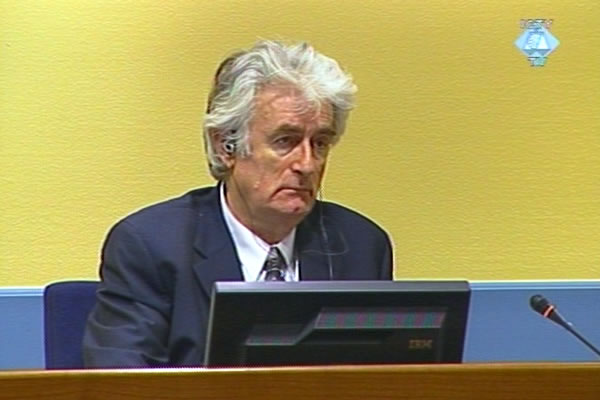Home
KARADZIC’S MOTION ON HOLBROOKE AGREEMENT DENIED
As the Trial Chamber considered Karadzic’s motion challenging the jurisdiction of the Tribunal because of a purported immunity agreement, it didn’t try to establish what and if anything Holbrook had promised to the accused. Acting on the assumption that such an agreement really does exist, the Trial Chamber considered its possible legal effects
 Radovan Karadžić u sudnici Tribunala
Radovan Karadžić u sudnici Tribunala The Trial Chamber with Judge Bonomy presiding denied today Radovan Karadzic’s motion challenging the jurisdiction of the Tribunal because of a purported immunity agreement concluded in July 1996 between Karadzic and US representative Richard Holbrooke.
In considering Karadzic’s motion, the Trial Chamber didn’t try to establish what if anything Holbrook promised to the accused. Instead, the Chamber acted on the assumption that such an agreement really did exist, and went on to consider its possible legal effects.
The legal effects, the Trial Chamber states in its decision, depend in the final analysis on whether the agreement could be attributed to the prosecution which has the discretionary right to decide whether it wants to prosecute or not. The Trial Chamber found that Karadzic failed to show any evidence to prove the involvement of the prosecution with Holbrooke’s initiative; on the other hand, the OTP didn’t do anything to withdraw the indictment against Karadzic. Quite the contrary, in a Rule 61 hearing held in July 1996 the Tribunal’s OTP asked for the indictment to be confirmed and an international arrest warrant to be issued. The Dayton negotiations were underway when the prosecution filed a new indictment against Karadzic and Mladic for Srebrenica, in an effort to pre-empt any immunity agreements.
The immunity agreement would have legal effects if the involvement of the UN Security Council were to be proved; the jurisdiction of the UN Security Council over the Tribunal is beyond doubt since it may amend the Statute of the Tribunal and issue guidelines for its operation. The Trial Chamber has however decided that there is no evidence showing that the Security Council was in any way involved with the Holbrooke agreement. The Security Council didn’t confirm the Holbrooke agreement. It was not even seized of it. It never issued a resolution granting immunity to Karadzic or anybody else. The Security Council didn’t change the Statute in a way allowing the suspension of the proceedings against the former Republika Srpska president. On the contrary, the decision notes that less than three weeks after the Holbrooke agreement was concluded, the Security Council issued a presidential statement condemning the failure of the states to arrest persons indicted for war crimes. Karadzic and Mladic were top of the list.
Having found that the Tribunal was in no way bound by the Holbrooke agreement, the Trial Chamber rejected Karadzic’s alternative request for the charges against him to be dropped because of ‘abuse of process’. Apart from making a number of claims about Holbrooke’s duplicity, the Trial Chamber concluded, the accused has failed to offer any evidence on the alleged abuse of process that would warrant the dropping of the charges.
As Karadzic’s legal advisers have already scheduled meetings with Swedish minister Bildt and the UN representatives to ask for additional information on the Holbrooke agreement, the Trial Chamber has encouraged them to go ahead; any new information may be useful in the appellate proceedings or for sentencing purposes.
Linked Reports
- Case : Karadzic
- 2009-06-11 LORD OWEN ‘RELUCTANT’ TO TESTIFY FOR THE PROSECUTION
- 2009-06-03 KARADZIC WONDERS WHY HE HAS BEEN INDICTED DESPITE SO MUCH EXCULPATORY EVIDENCE
- 2009-05-27 ALL THE PRESIDENT'S MEN
- 2009-07-09 KARADZIC DENIES RESPONSIBILITY FOR TWO MARKALE EXPLOSIONS
- 2009-07-23 KARADZIC ANNOUNCES HE WOULD DEBUNK ‘SREBRENICA MYTH’
- 2009-08-20 KARADZIC CASE READY FOR TRIAL
